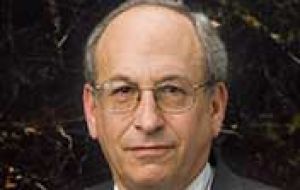MercoPress. South Atlantic News Agency
Federal Reserve cools hopes of second rate cut this month
 Fed Vice Chairman Donald Kohn
Fed Vice Chairman Donald Kohn The United States Federal Reserve Board Vice Chairman Donald Kohn said on Friday policy makers must be “nimble” in setting interest rates given the risks of both slower U.S. economic growth and faster inflation.
"We do not know how financial markets will evolve, and we do not know how households and businesses will respond to financial developments'' Kohn said in a speech in Philadelphia. "We will need to be nimble in adjusting policy to promote growth and price stability". But Kohn avoided any indication the US central bank is preparing to lower rates a second time, predicting the economy will return to "moderate" growth after "near-term weakness". His remarks underscored the skepticism expressed by four Fed district bank presidents in past weeks about the need for further cuts. Defending the Federal Open Market Committee's decision to cut the benchmark rate by an unexpectedly large half-point last month to 4.75%, Kohn said lowering borrowing costs "too much, or too rapidly", would better serve the economy than "acting too little, or too slowly". Market analysts have scaled bets the Federal Reserve will lower borrowing costs again when they meet on Oct. 30-31. The odds fell to less than 50% following the Labor Department report showing that job growth exceeded economists' forecasts in September. In effect the release of the latest employment data leaves the Fed with a difficult decision to make at their next meeting. The 50 points cut in September came after poor jobs data was released for August and numbers have now been upwardly revised. The US added nearly 200.000 jobs in August and September, and the government retracted its estimate that the country lost 4,000 jobs in August. The data stated that it actually rose 89.000. Addressing the Greater Philadelphia Chamber of Commerce's annual meeting Kohn said he's looking for "moderate growth with high levels of employment"' after "near-term weakness" from housing and "spillover from tighter credit conditions" passes. Households have proved "resilient" and corporate balance sheets are in "good shape", Kohn said. While housing markets will likely stay "depressed in coming months", evidence so far shows "limited" effects of the financial turmoil on spending. The remarks are Kohn's first full speech on the economy since January and the first on the outlook by a Fed governor since the rate cut. Kohn previously said in a September 21 speech that the rate cut was designed to "forestall" adverse effects on the economy from the tumult in financial markets, echoing the Fed's statement. The Fed's preferred price gauge, which excludes food and energy costs, rose 1.8% from a year earlier in August, the third straight month within the 1 to 2% comfort range stated by several officials. Still, the Fed said in its last statement that inflation risks remain. "We would not have eased policy if the outlook for inflation had not been favorable" revealed Kohn. He added that it's "critical" for price expectations to stay "well contained" and that rising labor costs, slowing productivity growth and a falling dollar present inflation risks. "Allowing inflation to rise would not be in the public interest", Kohn said. "We on the FOMC will continue to monitor economic developments closely and will act as necessary to promote both price stability and sustainable economic growth".




Top Comments
Disclaimer & comment rulesCommenting for this story is now closed.
If you have a Facebook account, become a fan and comment on our Facebook Page!